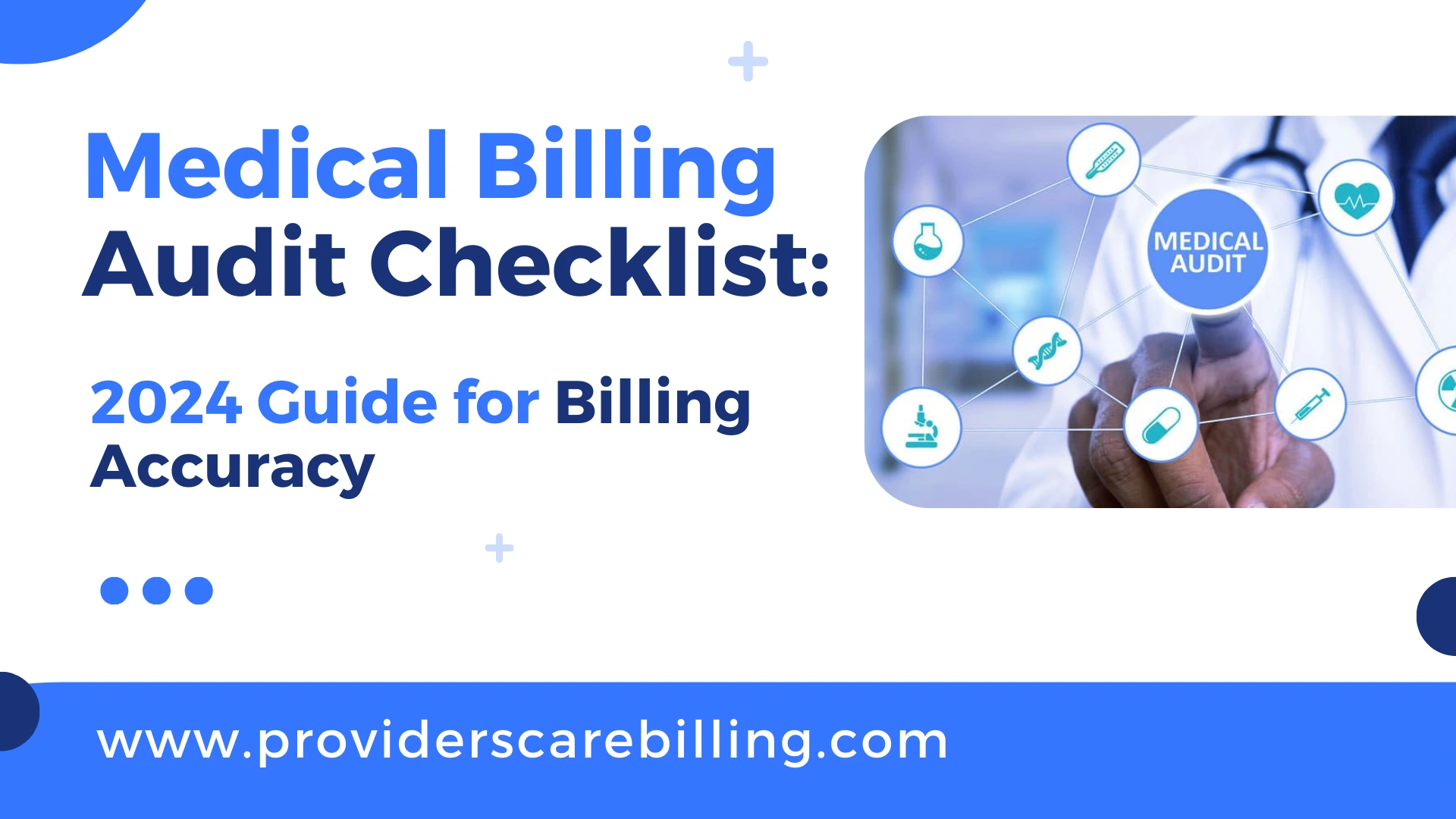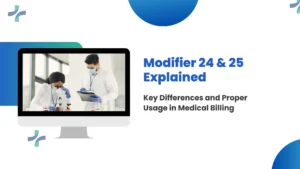A medical billing audit is a systematic examination and evaluation of a healthcare provider’s financial documentation and billing practices. This process thoroughly assesses the accuracy, completeness, and compliance of billing records, coding procedures, and reimbursement processes. The primary objective of medical billing auditing is to ensure that the provider’s billing practices align with industry standards, regulatory requirements, and insurance policies.
The importance of medical billing auditing services lies in their ability to detect and address potential errors, anomalies, and fraud within billing systems. Regularly completing these audits allows healthcare providers to maintain compliance, lower the chance of insurance company or government agency audits, and limit the risk of financial losses caused by claim denials or legal penalties.
What is Medical Billing Auditing?
Medical bill auditing is a thorough examination conducted to assess the precision and efficacy of clinical documentation within a healthcare organization. This process involves scrutinizing the accuracy of records maintained by the organization and the billing documents submitted to payers. The aim of medical bill audit services is to identify, monitor, and rectify inappropriate billing practices.
Conducting a precise medical billing audit is a multifaceted undertaking. It necessitates the management of diverse data sources, including clinical records, financial documents, accounting records, and policy-related documentation. Therefore, it is crucial to consolidate all relevant information into a unified system and ensure its systematic organization.
Ways to Conduct Best Medical Billing Audit
There are various approaches to conducting comprehensive audits in medical billing, with options for both internal and external evaluations. The utilization of medical billing audit software and collaboration with specialized medical billing companies enhances the efficiency and accuracy of the auditing process. Many organizations adopt a combination of internal and external audits to achieve a more comprehensive evaluation. Internal audits focus on regular billing accuracy and compliance assessments using dedicated personnel, while external audits provide a more profound examination, offering an independent opinion on the billing practices.
1- Internal Audit
Internal audits involve a dedicated team within the healthcare organization regularly conducting assessments to ensure transparent and efficient billing practices. This approach is well-suited for medium to large-sized healthcare entities that can maintain an in-house team of auditing professionals.
2- External Audit
On the other hand, external audits entail partnering with external auditing bodies, such as a medical billing audit company, to assess billing practices against industry standards and identify potential issues. This option is particularly beneficial for smaller practices that may need more internal specialists.
What are the Key Components of a Medical Billing Audit Checklist?
Precision in Claims Submission
Ensure that claims are properly coded, well-documented, and filed within the prescribed timeframe. Using medical billing audit software improves accuracy, reduces the risk of claim denials and any fraudulent activity, and ensures prompt reimbursement for services given.
Regulatory Compliance Assurance
Validate adherence to crucial regulations such as the Health Insurance Portability and Accountability Act (HIPAA) and the Affordable Care Act (ACA). Thorough compliance safeguards patient privacy, guarantees adherence to billing guidelines, and shields against legal penalties. Partnering with a reputable medical billing audit company can provide expert insights into regulatory compliance.
Coding Practices
Scrutinize the accuracy and appropriateness of medical codes employed for procedures and diagnoses. Seamless coding is pivotal for precise billing, ensuring optimal reimbursement, and compliance with established coding guidelines such as the International Classification of Diseases (ICD) and Current Procedural Terminology (CPT). Medical billing audit services can streamline this process, offering expertise in coding practices.
Elevating Documentation Quality
Assess the completeness and clarity of medical documentation supporting billed services. Robust documentation is essential for accurately recording medical necessity, treatment details, and patient information. This ensures the validation of claims during audits or reviews. Collaborating with a medical billing audit company enhances the scrutiny of documentation quality, offering a comprehensive evaluation of records.
Reimbursement Accuracy Assurance
Ensure that billed charges align seamlessly with contracted rates negotiated with insurance providers or payers. This critical step guarantees accurate reimbursement, minimizing the risk of under- or overpayment. Trust the expertise of the best medical billing audit services to streamline this process.
Denial Management Excellence
Evaluate the robustness of denial management processes with precision. Thoroughly analyze the reasons behind claim denials, identify patterns, and implement corrective actions. This strategic approach reduces revenue loss and enhances the billing cycle’s efficiency. Medical billing audit companies excel in comprehensive denial management.
Streamlined Billing and Collections Processes
Efficiency and effectiveness are the cornerstones of an optimized billing and collections process. Assess the timeliness, clarity, and accuracy of claim submissions and the documentation of patient statements and collections. Rely on the expertise of medical billing audit services to fine-tune these processes for improved revenue cycle management and enhanced cash flow.
Robust Internal Control
Evaluate the effectiveness of internal controls to safeguard against fraud, errors, or misuse of financial information. This includes scrutinizing the segregation of duties, implementing stringent access controls, and conducting regular audits. Trust the best medical billing auditing to ensure the integrity and security of financial data.
How to Audit Medical Billing: A Comprehensive Guide
This step-by-step tutorial shows how to conduct a successful medical billing audit, taking into account best practices and industry standards.
Step 1: Define the Audit Scope
Begin by mapping out the scope of the medical billing audit. Estimate the number of providers, payers, billers, and coders involved to allocate appropriate resources. This initial step sets the groundwork for a thorough and targeted examination.
Step 2: Assemble a Team of Experts
Combine internal and external audit resources, including independent audit consultants with expertise in formatting health records, coding, auditing principles, billing procedures, and regulatory compliance. The collaboration ensures a comprehensive assessment of medical billing processes.
Step 3: Task Distribution and Audit Strategy
Redistribute tasks among the audit team and develop a strategy. Opt for a random selection of records per provider and payer to maintain objectivity. This step lays the foundation for a systematic documentation review to identify discrepancies or inaccuracies.
Step 4: Documentation Investigation in EHR and Billing System
Delve into examining billing reports, charges, codes, and critical records in the Electronic Health Record (EHR) and billing system. Ensure medical billing audit services align with treatment plans, are accurately documented, and correct billed charges. Compare CPT codes reimbursement against contract terms with payers and identify potential risks through regular performance comparisons.
Step 5: Acknowledge or Contest Findings
Upon completion of the audit, accept any identified issues and promptly address them. If disagreements arise, providers have the option to contest audit findings within a 60-day window.
Final Thoughts
Creating an in-house medical billing audit checklist presents numerous challenges due to the intricate nature of medical billing regulations, frequent updates, resource-intensive training, software requirements, the necessity for specialized expertise, time constraints, potential biases, and the risk of overlooking crucial areas. Opting for a third-party partner, such as Providers Care Billing LLC, a leading medical billing company with expertise in complete medical billing services can offer a more effective and reliable solution. Engaging a specialized professional in medical billing can significantly aid in successfully implementing the best medical billing audit checklist. Their experience and proficiency ensure a thorough examination of claims accuracy, adherence to regulations, and streamlined reimbursement processes.




